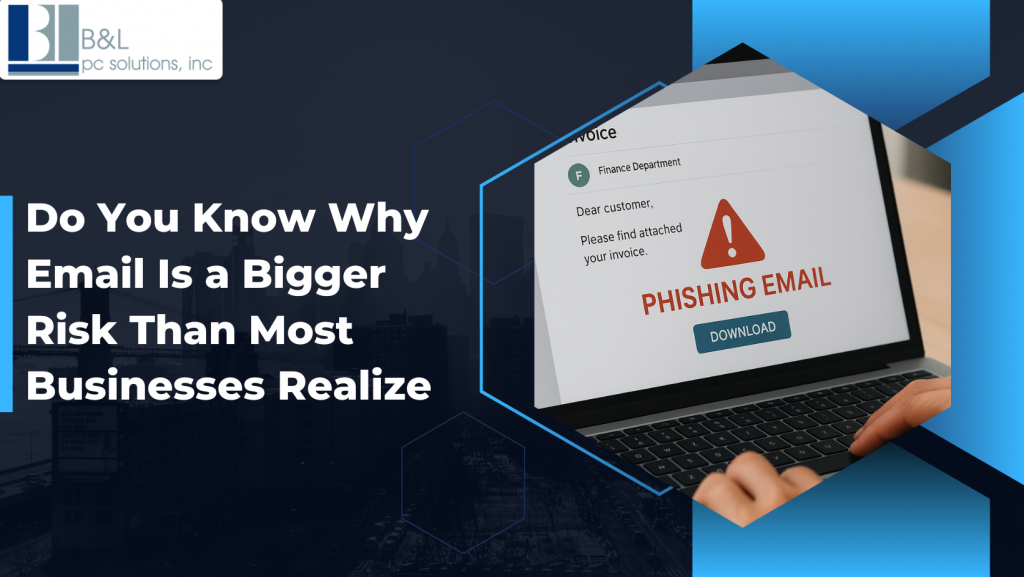
Most companies use Emails for everything. Not just mails, but also for contracts, invoices, calendars, shared folders, and even saved passwords. It’s all tied together in one place. That’s why hackers love it. All it takes is one breach, and they have access to your entire system.
In 2025, threats are not only more frequent but also more sophisticated. AI is now being used to craft emails that look like they came from your accountant, your lawyer, or your own staff. The frightening part is that they look so convincing. Tampa businesses are experiencing an increase in these attacks, particularly those targeting finance teams and remote workers.
What Happens When Email Gets Compromised
When your Email gets compromised, you don’t just lose access to your inbox. A hacked Email account can lead to:
- Leaked client data
- Fraudulent wire transfers
- Ransomware locking up your Document Drive
- Legal headaches from compliance violations
Local businesses in Tampa are more vulnerable. Many of them don’t use the best technical professionals. They rely on Email for critical tasks, including billing, onboarding, and daily tasks. One wrong click is all it takes to trigger a catastrophe.
The hackers do not cause immediate damage. They want to get more out of their efforts, and that’s why they will watch your movements closely, track your activities, and then strike a blow so big that recovery can be a huge challenge. You can probably survive by detecting such attacks on your inbox early.
Deepfake Scams Are No Longer Sci-Fi
You receive a voicemail that sounds exactly like your CEO. The voice asks for login credentials or a quick transfer of funds. You act fast and without thinking because it sounds real and urgent. But it’s not.
Deepfake audio is now being used in phishing campaigns. It’s not just emails anymore. Hackers are using a mix of voice, video, and AI-generated messages to dupe employees and trick them into sharing sensitive data. The worst part is that even experienced professionals have become victims of these scams. That’s how good this scam technology is. When your clients lose trust once, to regain it will be an insurmountable task.
Zero-Day Attacks: You Don’t See Them Coming
Some attacks don’t rely on tricking people. They exploit flaws in Email itself. These are in the form of bugs that Google has not yet patched. These are called zero-day vulnerabilities. And they are dangerous because your antivirus won’t catch them. It doesn’t even know they exist.
Businesses need more than antivirus software, precisely for these reasons. They also need active monitoring and fast patching. B&L PC Solutions helps Tampa companies stay ahead of these threats by watching for unusual behavior and applying security updates before problems spread.
Quantum Computing: The Next Big Threat
Does the name sound futuristic? It might, but quantum computing is already making its presence felt. Quantum computers are craftily designed to break encryption that was once considered the cornerstone of digital protection. With this threat looming, you need something more than just secure passwords and powerful email protocols to prevent hackers from gaining an upper hand.
Many leading tech corporations are working on quantum-safe encryption, but businesses must start early, especially those that handle sensitive data, such as healthcare providers, financial services firms, and law firms.
What Tampa Businesses Can Do Right Now
You don’t need a massive budget to protect your Email accounts. But you do need a plan. Here’s what the experts at B&L PC Solutions recommend:
- Use Unique Passwords
Skip the pet names and birthdays. Use long, random passwords. Have you considered using a password manager? - Turn On Two-Factor Authentication
Two-factor authentication is undoubtedly a powerful solution to address this problem. The process employs an extra security layer. Even if your password is accessed by someone illegally, they will not be able to get into your inbox without accessing a code from your phone. Some accounts rely on a physical security key. - Clean Up App Access
Go into your Google account settings. Remove old apps you don’t use. A few may be outdated or have a risk element. - Monitor Account Activity
Check the location of your email access. Is it from an overseas source? Has a device unknown to you attempted to access your account? Change your password now! - Encrypt Your Emails
If you are sending sensitive information, use encryption to protect it. It makes your messages unreadable to anyone who intercepts them. This is especially important for legal and healthcare firms. - Train Your Team
Cybersecurity isn’t just a tech issue anymore. It affects real people. Run phishing simulations. Teach employees how to spot suspicious messages. Make security part of your culture. - Create a Response Plan
Are you prepared if something goes wrong? What’s the first step? Whom do you connect with? Have a clear plan in place. A faster response will mitigate the level of damage..
Why B&L PC Solutions Is the Right Fit for Tampa Businesses
We are not just tech experts; we are locally available. We know the challenges Tampa businesses face. Whether you are a five-person team or a growing company with remote staff, we build security plans that fit your size and your budget.
Here’s what we offer:
- Round-the-clock monitoring
- AI-based threat detection
- Phishing simulations for staff
- Email encryption Service:
- Backup and recovery planning
- Assistance in HIPAA, GDPR, and other compliance needs
We don’t sell bundled packages. We listen, assess, and build something that works for your business.
Conclusion
Emails are useful, but it’s also risky. Not yet convinced about its vulnerability? You are at a huge risk. Remember, cybercriminals are trying newer ways to trick you. Your security strategy must be a few steps ahead of them.
At B&L PC Solutions, we can help you beat them. Call us to know how we can protect your business from cybercriminals.
Tags: CyberAwareness, EmailSecurity





